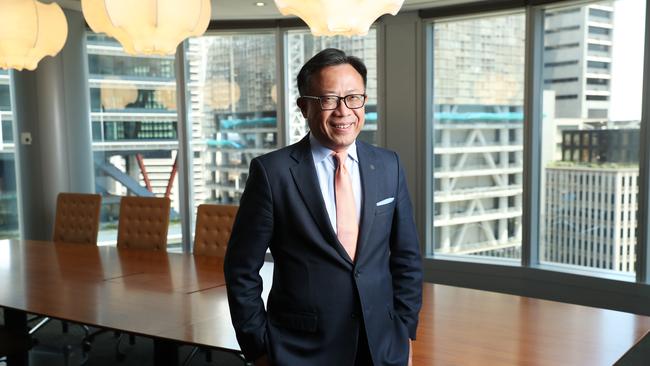UBS says China’s renewed focus on growth should reinvigorate a Covid-restricted economy
Financial markets are taking a positive view as Beijing prioritises growth and eases its severe lockdowns to curtail Covid-19.

China’s outlook remains critical for the global picture. Despite health and inflation risks as China eases Covid-19 restrictions after a wave of protests last month, financial markets are taking a positive view as Beijing also prioritises growth.
The head of China and the Asia-Pacific at UBS Asset Management’s, Shanghai-based Raymond Yin, sees a better year ahead as cooling US inflation lessens the risk of a hard landing globally and China moves away from pandemic restrictions.
“The government has dramatically relaxed its Covid policy and there will be some near-term pain, but once we come out of that, the stockmarket will recover quickly, because the government has also signalled that it will be focused on the economy,” he says.
The Shanghai Composite is down 13 per cent this year after bouncing 10 per cent in recent weeks. Yin says the exact target that China sets for 2023 growth won’t matter as much as the clear shift by the government from focusing on Covid restrictions toward economic growth.
UBS and JP Morgan analysts downgraded their recommendations for many of Australia’s largest mining companies this week. It came after the share prices of miners and their underlying commodities soared in recent weeks amid reopening moves in China.
“Right now you see a lot of short-term knee-jerk reactions by the market – commodity-related company share prices – but it’s still too early to say exactly how these reopening steps by China will translate into GDP and import demand by China and so on,” Yin says.

“But I can tell you anecdotally, as soon as the government announced the reopening measures, there were several delegations by provincial governments and local government officials to countries like Japan and countries in Europe, to facilitate commerce.
“They want to bring back the orders to China that were lost because of the zero-Covid policy.”
The hope is that supply chain bottlenecks that have been a feature of global markets for almost two years will continue to dissipate as China’s factories increasingly resume normal production.
China’s reopening is bound to cause some hiccups, as it did in the West. But Yin says there’s no going back and China’s longer-term economic outlook is solid. “I think there’s no returning, because they have scrapped the contact tracing applications,” he says.
A few weeks ago, there were images circulating online of vast new quarantine centres in China. But these came before the announcement of policies reversing the harsh Covid lockdowns.
“The picture I’ve been seeing is the demolishment of these facilities,” Yin says. “Right now, people are encouraged, for minimal or no symptoms, to stay at home. They’re not encouraged to go to the hospital and crowd out valuable facilities.”
Recent data in China have felt the effects of the Covid policies, with monthly trade, retail sales and industrial production coming in below estimates.
But markets have largely brushed off China’s disappointing data as investors assume the economy won’t suffer long-term damage from Covid restrictions.
“It’s hard to point to the exact trigger (for the end of the zero-Covid policy), but the outcome is that this policy has been reversed quite fast, to most people’s surprise,” Yin says. “Over the long run, hopefully this is a step in the right direction.”
China’s property sector have also weighed on sentiment. Many analysts predict it they will take a long time to be resolved.
But Yin has a more constructive view on this front. “The government has stepped in to help out on the liquidity side, with a 16 point plan allowing public companies to come back to the capital market for fundraising, and they’ve asked state-owned banks to extend loans to property companies,” he says.
While not expecting a boom in property any time soon, he thinks these measures will prevent a collapse. They will also help banks which have property as collateral. “We have seen a pretty strong rebound in both the equity and fixed income markets in reaction to these policy measures, so we hope the worst is over, and the property market will be more stable.”
He also sees a recovery in China providing an offset to recessions in the US and Europe in 2023. “That is a plausible scenario, but is China going to save the world? I’m not sure. There’s also a fair question whether the reopening of China would also translate into higher inflation as demand picks up, so it’s not a very clear picture. Overall, having China with stronger growth would help support global growth.”
UBS has more than 1300 staff in China, by far the most among international investment banks. UBS set up the first joint venture fund management company licence in China in 2005 and will seek to establish a wholly owned FMC in the near future.
“China is a key strategic market for us globally,” Yin says. “So despite all the noises, we want to keep investing there long term.”
Asia-Pacific and the US are the priority growth areas for UBS.
“We have been in Australia for over 30 years and have a very large presence,” he says. “We believe we can do a lot more in terms of bringing global products local, bringing ESG products from our European experience and developing solutions for clients.”




To join the conversation, please log in. Don't have an account? Register
Join the conversation, you are commenting as Logout